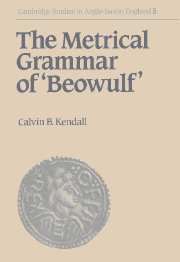Book contents
- Frontmatter
- Contents
- Preface
- List of abbreviations
- List of changes from Klaeber's text
- 1 The Beowulf-poet and his metrical grammar
- 2 The alliterative and metrical principles of Beowulf: Kuhn's ‘laws’ and the transformational rule
- 3 The three kinds of half-lines: extra-metrical alliteration and type A3
- 4 Displacement
- 5 Stressed proclitic adjectives: X-positions and the insertion rule
- 6 Problems with the identification of clause-non-initial half-lines: the proclitic onset
- 7 Half-lines with internal clause divisions: the transformational rule (revised)
- 8 The alliterative requirement of unstressed prefixes and the copulative conjunctions
- 9 The alliterative requirement of prepositions and the proclitic adverbs and instrumentals
- 10 The alliterative requirement of proclitic adjectives and pronouns: the alliterative rule of proclitics
- 11 Displaced and detached proclitics
- 12 The three classes of compounds: the alliterative requirement of class I compounds
- 13 The alliterative behaviour of class II compounds
- 14 The alliterative behaviour of class III compounds and simplexes
- 15 Metrical typology and the metrical grammar
- 16 Conclusions
- Appendix: A typology of the metre of Beowulf in relation to the metrical grammar
- Glossary of technical terms
- Bibliography
- Index of alliteration, scansion and metrical clause structure
- Index of verses specially discussed
5 - Stressed proclitic adjectives: X-positions and the insertion rule
Published online by Cambridge University Press: 22 September 2009
- Frontmatter
- Contents
- Preface
- List of abbreviations
- List of changes from Klaeber's text
- 1 The Beowulf-poet and his metrical grammar
- 2 The alliterative and metrical principles of Beowulf: Kuhn's ‘laws’ and the transformational rule
- 3 The three kinds of half-lines: extra-metrical alliteration and type A3
- 4 Displacement
- 5 Stressed proclitic adjectives: X-positions and the insertion rule
- 6 Problems with the identification of clause-non-initial half-lines: the proclitic onset
- 7 Half-lines with internal clause divisions: the transformational rule (revised)
- 8 The alliterative requirement of unstressed prefixes and the copulative conjunctions
- 9 The alliterative requirement of prepositions and the proclitic adverbs and instrumentals
- 10 The alliterative requirement of proclitic adjectives and pronouns: the alliterative rule of proclitics
- 11 Displaced and detached proclitics
- 12 The three classes of compounds: the alliterative requirement of class I compounds
- 13 The alliterative behaviour of class II compounds
- 14 The alliterative behaviour of class III compounds and simplexes
- 15 Metrical typology and the metrical grammar
- 16 Conclusions
- Appendix: A typology of the metre of Beowulf in relation to the metrical grammar
- Glossary of technical terms
- Bibliography
- Index of alliteration, scansion and metrical clause structure
- Index of verses specially discussed
Summary
As heirs of a tradition of accentual–syllabic poetry that is now some six centuries old, we take for granted, first, that poets writing in English normally arrange the natural stress patterns of the language to accord with an abstract metrical pattern and, second, that they often wrest these patterns – either of natural stress or of metre – into other shapes when it suits their purposes. This means that we expect lexically significant words, such as nouns and adjectives, to receive metrical stress, in contrast to proclitics and other function words, which typically do not. In this respect the modern tradition of English poetry differs little from the Old English. But we are not surprised to find distortions of natural stress to fit the metre – little words unexpectedly emphasized, normally significant words subordinated – or to find the metre bent to accommodate the natural rhythms of an oddly placed word. There is a constant tension between the demands of speech and the demands of metre which is variously resolved according to the emphases which poets choose to impose. This licence is alien to the tradition of Old English poetry. When words which are not ordinarily stressed elements and which are neither externally nor internally displaced take metrical stress and alliteration in Beowulf, it will not do to speak casually of the poet's placing rhetorical emphasis on normally unemphatic words. Even here, he is usually working within a describable set of conventions and often with traditional formulae.
- Type
- Chapter
- Information
- The Metrical Grammar of Beowulf , pp. 60 - 73Publisher: Cambridge University PressPrint publication year: 1991



